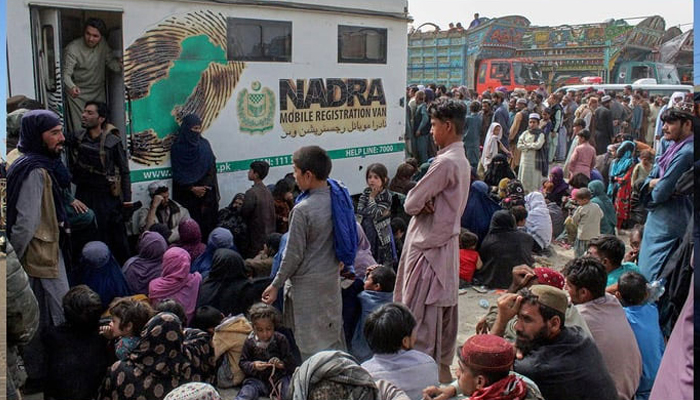UNHCR praises Pakistan for supporting refugees
Islamabad : Speakers at a national education workshop here on Saturday urged education stakeholders in Pakistan to collaborate on expanding Accelerated Learning Programmes (ALPs) to provide education for disadvantaged, over-age, out-of-school children and youth who have missed out on or had their education disrupted.
The workshop, organised jointly by United Nations High Commissioner for Refugees (UNHCR) and the Japan International Cooperation Agency (JICA), was attended by over 80 people, including government officials and education professionals from Punjab, Sindh, Balochistan, and Khyber Pakhtunkhwa provinces. Its focus was on best practices and opportunities for improved coordination and collaboration to meet Pakistan's significant educational needs. UNHCR representative in Pakistan Philippa Candler praised Islamabad for its support of refugees and their education.
She noted the alarming global figure of over 250 million children out of school, including 26 million in Pakistan, with 500,000 being refugees. Ms Candler emphasised the importance of ALPs in helping out-of-school refugee adolescents and youth access and complete primary education and transition to secondary education, especially for girls and young women. She called for collective efforts to improve education for all and reaffirmed UNHCR’s commitment to supporting policies and programs benefiting both refugee and host community children.
JICA country chief Naoaki Miyata highlighted Pakistan's critical demographic situation, with 67 percent of its population under 30. He noted JICA’s focus on human capital development through quality education and expressed that the workshop would help advocate for impactful accelerated education policies to address the out-of-school challenge. Senior joint secretary at the Ministry of Federal Education and Professional Training Sohail Akhtar Malik emphasised the urgency of the education crisis and the Prime Minister’s declaration of an education emergency. He stressed the need for innovative, cost-effective solutions, including the use of digital technology, to provide education to out-of-school children, particularly through accelerated learning programmes.
The workshop also featured discussions on effective practices, such as Allama Iqbal Open University’s ALP (Middle-Tech) programme, which serves about 3,000 children nationwide. Organisers said provincial consultations would soon begin, followed by national technical discussions in September, aimed at developing a unified approach to accelerated education and ensuring the programmes are accredited and effectively support children in need, regardless of their status.
-
 Jake Humphrey Shares The Powerful Meaning Behind His Wrist Tattoo
Jake Humphrey Shares The Powerful Meaning Behind His Wrist Tattoo -
 Matthew Lillard Weighs In On His Return To The 'Scream' Franchise After Decades Of Persistence
Matthew Lillard Weighs In On His Return To The 'Scream' Franchise After Decades Of Persistence -
 Travis, Jason Kelce Share Blunt Dating Advice For Men: 'She's Gonna Hate You'
Travis, Jason Kelce Share Blunt Dating Advice For Men: 'She's Gonna Hate You' -
 Australia To Launch First High-speed Bullet Train After 50-years Delay
Australia To Launch First High-speed Bullet Train After 50-years Delay -
 Meghan Markle Turns To Desperate Bids & Her Kids Are Her ‘saving Grace’: Here’s What They’ll Do
Meghan Markle Turns To Desperate Bids & Her Kids Are Her ‘saving Grace’: Here’s What They’ll Do -
 King Charles Gives A Nod To Sister Anne's Latest Royal Visit
King Charles Gives A Nod To Sister Anne's Latest Royal Visit -
 Christian Bale Shares Rare Views On Celebrity Culture Urging Fans Not To Meet Him In Person
Christian Bale Shares Rare Views On Celebrity Culture Urging Fans Not To Meet Him In Person -
 Ariana Grande To Skip Actor Awards Despite Major Nomination
Ariana Grande To Skip Actor Awards Despite Major Nomination -
 North Carolina Teen Accused Of Killing Sister, Injuring Brother In Deadly Attack
North Carolina Teen Accused Of Killing Sister, Injuring Brother In Deadly Attack -
 Ryan Gosling Releases Witty 'Project Hail Mary' Ad With Sweet Reference To Eva Mendes
Ryan Gosling Releases Witty 'Project Hail Mary' Ad With Sweet Reference To Eva Mendes -
 Teyana Taylor Reveals What Lured Her Back To Music After Earning Fame In Acting Industry
Teyana Taylor Reveals What Lured Her Back To Music After Earning Fame In Acting Industry -
 Prince William Shows He's Ready To Lead The Monarchy Amid Andrew Scandal
Prince William Shows He's Ready To Lead The Monarchy Amid Andrew Scandal -
 Lux Pascal Gushes Over Role In Tom Ford's 'Cry To Heaven': 'I Just Wanted To Be Part Of This Picture'
Lux Pascal Gushes Over Role In Tom Ford's 'Cry To Heaven': 'I Just Wanted To Be Part Of This Picture' -
 Near-blind Refugee Found Dead In Buffalo After Release By US Border Patrol
Near-blind Refugee Found Dead In Buffalo After Release By US Border Patrol -
 Firm Steps In Forcing Andrew’s Hand: ‘Can No Longer Keep A Promise'
Firm Steps In Forcing Andrew’s Hand: ‘Can No Longer Keep A Promise' -
 Kenyan Man Accused Of Recruiting Men To Fight In Ukraine
Kenyan Man Accused Of Recruiting Men To Fight In Ukraine




